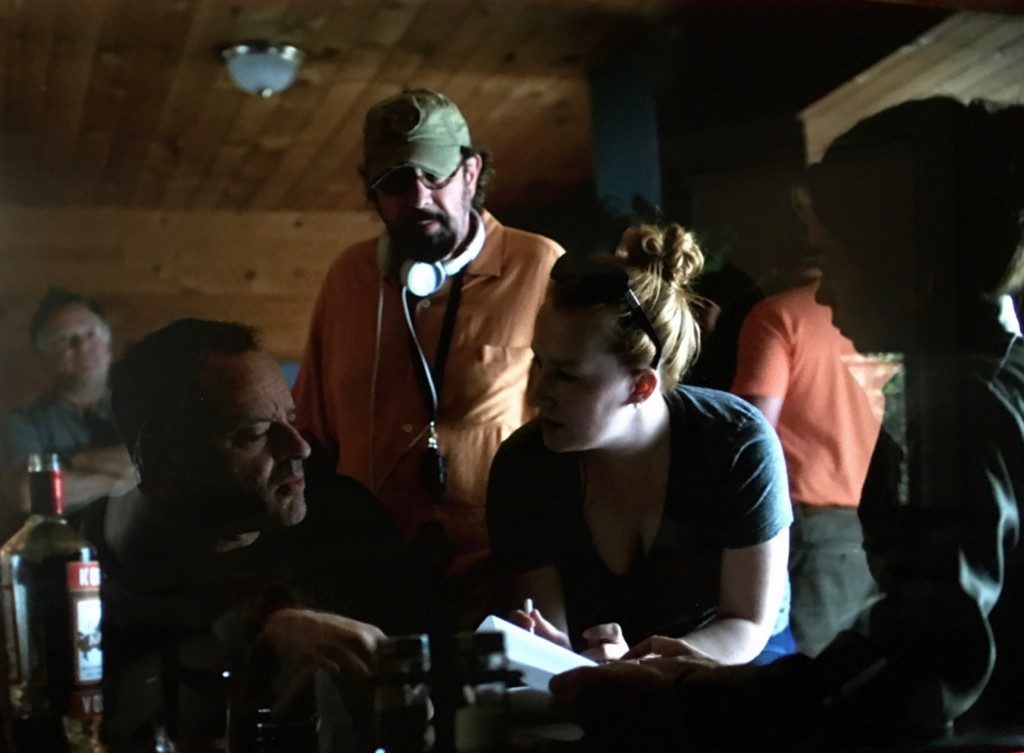
Guest Post by Jennifer Coté
Juxtaposing snapshots of my life from one year ago with where I am today looks like time-lapse photography eons in the making. Last June, I was a showrunner’s assistant, and this summer I served as the writer-producer on set for USA Network’s “Eyewitness.” While my experiences aren’t as glamorous as they sound, I’ve learned some concrete lessons that just might help others make career leaps.
Start from The Bottom, No Matter How Old You Are
For most of us — unless you’re the product of nepotism or were “discovered” through some freakish turn of events in which Dolly Parton read a haiku you wrote on a Starbucks cup then turned it into a country song that HBO suddenly optioned — starting anyplace other than the bottom isn’t possible. Knowing this didn’t make it any less demoralizing when I moved to LA with a decade of copywriting experience and a seemingly worthless screenwriting MFA in my back pocket. But, I felt a huge weight lift when I finally gave myself permission to stop fretting about my age/un-famous bloodlines and set out to find an apprenticeship of sorts with an established writer. Through this process, I met Adi Hasak, a feature writer transitioning into television, and I began as his assistant back in 2011.
Work for Someone Who Needs You
Early on, I identified that I complemented my boss and could even see myself producing with him one day. Thus, my advice to anyone seeking an assistant position with growth potential is this: Find someone whose weaknesses are your strengths, then work your ass off to prove you’re indispensable. I must stress how important it is to work with someone who needs you in more than an assistant capacity, though — if you’re needed only for clerical or entry-level creative things, there will be no incentive to advance you.
Read Minds
Stop asking people what you can do for them or what they want on their pizza. Instead, identify what they need and simply do it for them. It is a complete misconception that powerful people in Hollywood want someone to bend to their every whim — no, they want fucking mind readers. You become truly valuable only when no one needs to give you directions.
Be Art-Interested, Not Self-Interested
There are few greater turnoffs than someone asking, “What’s in it for me?” And yet, this question reverberates in every assistant’s brain across our narcissism-laced city and is glaringly transparent to employers. To combat this, I actively changed the way I thought about daily challenges. I started approaching every task with the goal of making an amazing finished product, and began approaching every writer or executive with the mentality of, “What can I learn from you?” instead of, “What can I get from you?”
Pick Your Moments
After significant time grinding away and making yourself subtly indispensable, you’ll need to ask for advancement. For me, this went a little something like this: I worked closely with Adi for three years on spec pilots before he got a passion project greenlit at NBC, “Shades of Blue” (starring Jennifer Lopez). I felt ecstatic being involved in such a huge TV series and spent the summer before the writers’ room opened making a detailed bible with Adi. At this point, a more brazen person would have asked to be written into their boss’s deal as a writer, but the timing felt wrong. Instead, I was staffed on the show as an unconventional showrunner’s assistant who fully participated in the writers’ room. Then, after spending nine months in the Shades writers’ room plus nearly four years working with Adi, I finally felt ready to make the biggest leap of my career when he got “Eyewitness” greenlit at UCP/USA. Breathing deeply, I approached Adi and basically asked, “Can you please help me get a position on this show that reflects how much I’m going to kick ass for you?” And he did — I got my very first staff writer deal.
Kick Ass at Your Job, But Kick More Ass at the Job You Want
No matter your position, you almost always need to do the job you want before you get it. As an assistant, this meant anything from pitching story ideas to giving notes on writers’ work when my boss didn’t have time. As a staff writer on “Eyewitness,” this meant taking on any tasks that needed doing within the next job I aspired toward — that of a showrunner. I ran our small writers’ room when it needed running, rewrote scenes or outlines when they needed rewriting, coordinated staffing, and was the go-to person staying up until the wee hours meeting deadlines.
Show Up and Get Shit Done
About a month before the “Eyewitness” writers’ room closed, my boss asked me to move to Canada for four and a half months as an on-set producer. This was insane for personal reasons (I would need to leave my husband, home, and adorably persnickety dog), and it was downright intimidating for professional reasons (chiefly, I’d never produced anything let alone worked on a film set before). Resolving to simply say “yes” to this career opportunity of a lifetime and drown in worry later, I began shopping for wool-lined hiking boots and seeking advice from colleagues. It was then that I received this gem: “Just be the person who shows up and gets shit done.” And, I can honestly say this became my only game plan throughout 71 days of shooting.
Trust Your Gut
Any given day during production looked like this: my boss churned out rewrites and new scripts in his office while I oversaw set from call to wrap. With zero lifelines or cell service in our remote location, this meant it was up to me and my gut to make snap judgements and scene cuts. I had to dare to be the adult in the room and make tough calls, so I quickly learned to say, “This is right, and this is what we’re doing,” even while shaking in my wool-lined boots.
Criticize Constructively and Don’t Gossip
You know that icky feeling you get from reading your cousin’s vegan-with-a-vengeance blog or angsty Reddit threads? Well, a while ago I noticed that I feel the same way after interacting with gossipy coworkers. I really thought about it and realized that every good boss I’d ever had avoided complaining about their employees. Good bosses simply don’t gossip or ridicule other people’s shortcomings; they identify fixes, offer guidance, and pick up the slack where needed. When I learned that I’d be taking a leadership position on set, I endeavored to never fall into the trap of gossiping or unproductively criticizing anyone. I may have known nothing about being a producer or boss, but I figured this was one thing I could do to make everyone feel supported and safe around me.
Make Others Shine
In our competitive industry, it often feels like one person’s success equals our own failure. However, within the community of “Eyewitness” as our cast and crew tirelessly elevated the material no matter how late the hour or buggy the air, I eventually identified my greatest career goal — to be someone who brings out the best in everyone she works with.
To summarize these lessons learned on my journey from assistant to de facto showrunner: be a nice person, advocate for yourself diplomatically, say, “yes, I can do that” even when frightened, and work your ass off every waking moment.
Jennifer Coté is a writer and producer based in Hollywood, California. She holds a BA in English literature from Mount Holyoke College and an MFA in screenwriting from The University of Texas at Austin. You can follow her @CoteWrites, and you can check out the entire first season of “Eyewitness” on USA Network, Amazon, and iTunes.







